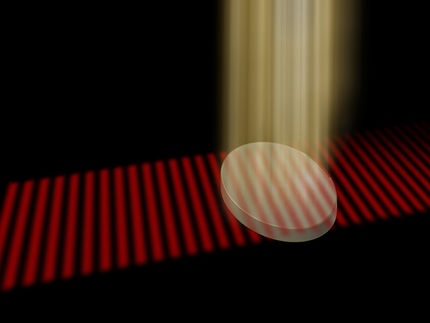UCLA researchers create polymer solar cells with higher efficiency levels
Advertisement
Currently, solar cells are difficult to handle, expensive to purchase and complicated to install. The hope is that consumers will one day be able to buy solar cells from their local hardware store and simply hang them like posters on a wall.
A new study by researchers at the UCLA Henry Samueli School of Engineering and Applied Science has shown that the dream is one step closer to reality. Reporting in the Journal of the American Chemical Society, Yang Yang, a professor of materials science and engineering, and colleagues describe the design and synthesis of a new polymer, or plastic, for use in solar cells that has significantly greater sunlight absorption and conversion capabilities than previous polymers.
The research team found that substituting a silicon atom for carbon atom in the backbone of the polymer markedly improved the material's photovoltaic properties. This silole-containing polymer can also be crystalline, giving it great potential as an ingredient for high-efficiency solar cells.
"With the reality of today's energy crisis, a new-game changing technology is required to make solar cells more popular," Yang said. "We hope that our newly synthesized polymer can eventually be used on solar cells far beyond their current rooftop applications. Imagine a house or car covered and powered by flexible solar films. Our dream is to see solar cells used everywhere."
But while polymer solar cells have been around for several years, their efficiency has, until recently, been low. The new polymer created by Yang's team reached 5.1 percent efficiency in the published study but has in a few months improved to 5.6 percent in the lab. Yang and his team have proven that the photovoltaic material they use on their solar cells is one of the most efficient based on a single-layer, low-band-gap polymer.
At a lower band gap, the polymer solar cell can better utilize the solar spectrum, thereby absorbing more sunlight. At a higher band gap, light is not easily absorbed and can be wasted.
"Previously, the synthesizing process for the polymer was very complicated. We've been able to simplify the process and make it much easier to mass produce," said Jianhui Hou, UCLA postdoctoral researcher and co-author of the study. "Though this is a milestone achievement, we will continue to work on improving the materials. Ideally we'd like to push the performance of the solar cell to higher than 10 percent efficiency. We know the potential is there."
Other news from the department science
Most read news
More news from our other portals
See the theme worlds for related content
Topic world Synthesis
Chemical synthesis is at the heart of modern chemistry and enables the targeted production of molecules with specific properties. By combining starting materials in defined reaction conditions, chemists can create a wide range of compounds, from simple molecules to complex active ingredients.

Topic world Synthesis
Chemical synthesis is at the heart of modern chemistry and enables the targeted production of molecules with specific properties. By combining starting materials in defined reaction conditions, chemists can create a wide range of compounds, from simple molecules to complex active ingredients.


























































